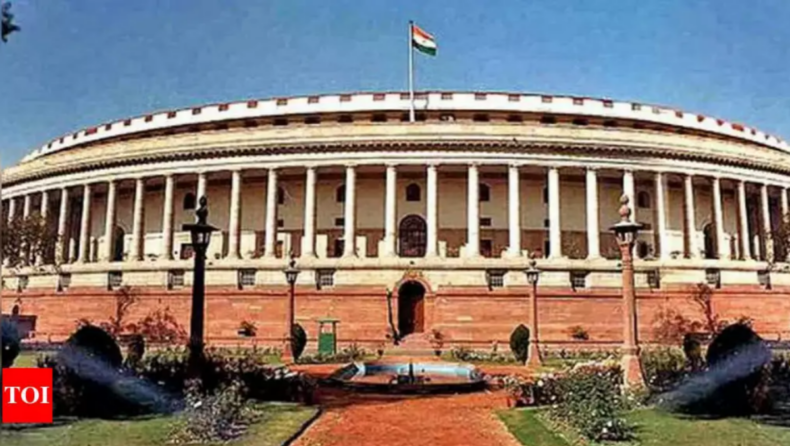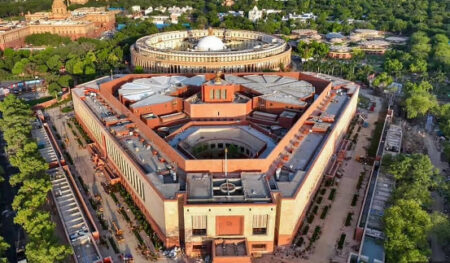A list of important bills that will be introduced during the monsoon session in 2022
On Monday, July 18, 2022, the beginning of the monsoon session of Parliament is scheduled to begin, and it is anticipated that it will continue until the 13th of August.

Beginning on Monday, meetings of both the Lok Sabha and the Rajya Sabha will take place at eleven in the morning.
According to the bulletin that was distributed by the secretariat of the Lok Sabha, a total of 29 laws are to be listed in Parliament, and of those, 24 are brand-new laws.
The following is information on significant bills that are likely to be introduced during the Monsoon Session in 2022.
The Bill Concerning the Press and the Registration of Periodicals, 2022
According to the Lok Sabha bulletin, the purpose of the Press and Registration of Periodicals Bill, 2022 is to replace the Press and Registration of Books (PRB) Act, 1867 by decriminalising the existing Act, keeping the procedures of the existing Act simple from the point of view of medium and small publishers, and upholding the values of press freedom.
The proposed piece of legislation aims to establish a press registrar general and expand its purview to include digital media. There is now no provision in India for the registration of digital news websites, and this situation will likely remain unchanged for some time.
An Act to Amend Certain Acts Relating to the Conservation of Forests, 2022.
The purpose of this bill is to make changes to the Forest (Conservation) Act, which was passed in 1980. These changes include making it clearer that the Act applies to a wider variety of land types and streamlining the procedure for obtaining permission under the Act.
A Bill to Amend Certain Provisions of the Insolvency and Bankruptcy Code, 2022.
The purpose of this bill is to reinforce the Insolvency and Bankruptcy Code, 2016 (IBC/Code) by inserting rules on Cross-Border Insolvency as well as by carrying out various additional adjustments for time-constrained resolution of stressed assets while maximising their value.
The Mines and Minerals (Development and Regulation) Amendment Bill, which will come into effect in 2022,
The Mines and Minerals (Development and Regulation) Act, 1957 is the piece of legislation that this bill intends to modify in order to bring about “policy changes” and to “increase the ease of doing business” in the industry.
A Bill Concerning Cantonments, 2022.
The administration of cantonments is going to be improved with the help of this measure in the hopes of achieving larger developmental goals on par with those of municipalities all across the country. In addition to this, it plans to improve the “comfort of life” in the cantonments.
The Historic Buildings, Archaeological Sites, and Archaeological Remains
The purpose of this bill is to rationalize the banned area as well as make some other adjustments.
The provision that allows a 100-meter prohibited area for construction activity around centrally protected monuments will be replaced with site-specific limits that will be decided by an expert committee under the proposed legislation, as reported by the news agency PTI. This will be the primary highlight of the bill.
The Constitutional Amendment (Scheduled Tribes) Order Bill of 2022
The revision of the list of Scheduled Tribes in Tamil Nadu and the revision of the lists of Scheduled Castes and Scheduled Tribes in Chhattisgarh will each be the subject of their own individual laws that will be submitted to parliament.
Bill 2022: Family Courts (Amendment).
The jurisdiction of the family courts, which is important for promoting swift resolutions of marriage-related problems, has come under scrutiny due to the lack of a requisite central government announcement.
In order to expedite the resolution of marriage-related disputes, the federal government has announced the establishment of family courts in the states of Himachal Pradesh and Nagaland.
In cooperation with the relevant high courts, the family courts will operate within the purview of the state governments.
The Monsoon Session of Parliament, which begins on July 18, is anticipated to see the introduction of the Family Courts (Amendment) Bill, 2022.
In order to encourage prompt resolution of family-related conflicts and enable mediation, the Family Courts Act of 1984 calls for the establishment of family courts by the state governments in conjunction with the high courts.
The National Dental Commission Bill, 2022
The Dental Council of India (DCI) is being disbanded by the government in favour of a National Dental Commission (NDC).
One of the significant provisions of the bill is the creation of the National Dental Commission, which would have both elected and ex-officio members and would be the top regulatory body for the dental profession and education.
It also envisions the creation of a Dental Advisory Council and a uniform national eligibility-cum-entrance test for admission to UG and PG dental education in all dental institutions.
Setting up a National Dental Commission and repealing the Dentists Act, 1948
Energy Conservation (Amendment) Bill of 2022
The Forest (Conservation) Act of 1980 was amended to, among other things, make it clearer when the Act applies to different types of lands and to speed up the approval process.
The People’s Trafficking (Protection, Care, and Rehabilitation) Bill of 2022
preventing and combating human trafficking, particularly trafficking of women and children; providing victims with care, protection, assistance, and rehabilitation while respecting their rights; and creating a legal, economic, and social environment that supports victims while also ensuring that offenders are brought to justice and matters related to it.
“Coffee (Promotion and Development)” Bill 2022
The modern promotion and development of the Coffee Board are made possible by the growth of the coffee business.
The Development of Enterprises and Services Hubs (DESH) Bill 2022:
The Development of Enterprise and Service Hubs will replace SEZs (DESH). These hubs will no longer be needed to be net foreign exchange positive cumulatively in five years (i.e., export more than they import).
With tariffs only on imported inputs and raw materials, the hubs would be able to sell easily in the domestic market. In the existing SEZ framework, domestic sales of final products incur tax.
The bill proposes an equalisation charge for domestic products and services to put taxes in line with foreign units. The new centres will abolish direct tax benefits, making them compatible with WTO regulations. The measure doesn’t limit units’ one-year storage capacity.
Foreign currency payments aren’t required. The Center’s Department of Commerce makes most SEZ decisions. Now, governments can participate and directly suggest development centres to a central board. State boards would supervise hubs’ operations.
The Kalakshetra Foundation (Amendment) Bill 2022
The Kalakshetra Foundation Act, 1993, was amended to allow it to award certificates, diplomas, postgraduate diplomas, graduate and postgraduate degrees, doctoral and postdoctoral courses, and conduct research in dance, traditional theatre, drama, Carnatic and traditional music, visual arts, craft education, and art education.
Additional Bills to be Introduced in Parliament
The following legislation is also anticipated to be proposed during the monsoon session:
- Multi-State Cooperative Societies (Amendment) Bill 2022
- 2022 Bill to Register and Protect Geographical Indications on Goods (Amendment)
- The Warehousing (Development and Regulation) (Amendment) Bill of 2022
- The Competition (Amendment) Bill 2022
- The Old Grant (Regulation) Bill 2022
- The National Nursing and Midwifery Commission Bill 2022
- The Indian Institute of Management (Amendment) Bill 2022
The Central Universities (Amendment) Bill, 2022 would also be used to present two other laws, one for the Central Tribal University in Telangana and the other for the transformation of the National Rail Transportation Institute into Gati Shakti Vishwavidyalaya.
Although it was presented during the budget session of 2022, the Indian Antarctic Bill was not referred to the Standing Committee. It will be open for discussion and approval.
The National Anti-Doping Bill, 2021; the Anti-Maritime Piracy Bill, 2019, the Maintenance and Welfare of Parents and Senior Citizens (Amendment) Bill, 2019, and the Wild Life (Protection) Amendment Bill, 2021 have all already been introduced and referred to the standing committee, according to the Lok Sabha bulletin. They will also be subject to evaluation and approval.













